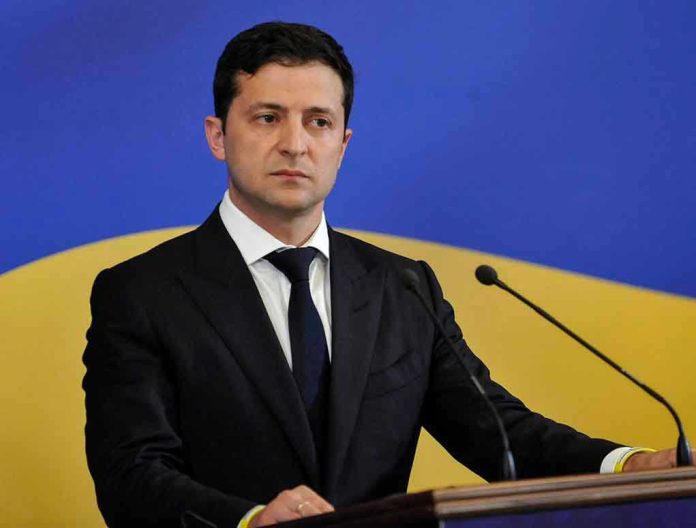
President Trump delivers a stark ultimatum to Ukraine, demanding Zelenskyy abandon NATO aspirations and accept the permanent loss of Crimea as the price for ending the devastating war with Russia.
Story Snapshot
- Trump publicly pressures Zelenskyy to drop NATO membership and Crimea claims for peace
- High-stakes White House meeting includes European leaders amid intense diplomatic negotiations
- Putin reportedly agrees to U.S.-led security guarantees as alternative to NATO membership
- Ukraine faces unprecedented pressure to make territorial concessions to Russian aggression
Trump’s Direct Ultimatum to Ukraine
President Trump issued a blunt message on Truth Social declaring “No getting back Crimea… and NO GOING INTO NATO BY UKRAINE. Some things never change!!!” The statement came just days before a crucial White House meeting with Ukrainian President Volodymyr Zelenskyy and several European leaders. Trump’s direct public pressure represents a dramatic shift from previous U.S. positions that supported Ukraine’s territorial integrity and NATO aspirations.
Alternative Security Framework Emerges
U.S. Special Envoy Steve Witkoff revealed that Russia has agreed to allow America and Europe to provide Ukraine with “NATO-style” security guarantees. This represents a significant departure from previous Russian positions that rejected any Western security arrangements for Ukraine. The proposed framework would offer Article 5-like protections without formal NATO membership, though specific details remain classified and unconfirmed by independent sources.
European Leaders Rally Around Ukraine
NATO Secretary General Mark Rutte, French President Emmanuel Macron, and U.K. Prime Minister Keir Starmer joined the White House meeting amid concerns about regional security implications. Secretary of State Marco Rubio denied allegations that European leaders attended to shield Zelenskyy from American pressure. However, their presence signals deep European anxiety about any settlement that legitimizes territorial conquest through military force, potentially setting dangerous precedents for future conflicts.
The proposed peace framework raises fundamental questions about rewarding aggression with territorial gains. Conservative principles traditionally emphasize strength through deterrence and supporting allies against authoritarian expansion. While ending the costly conflict appeals to fiscal conservatives concerned about endless foreign spending, accepting Putin’s territorial seizures contradicts core American values of sovereignty and self-determination that have guided successful foreign policy for decades.
Implications for American National Security
Trump’s approach prioritizes achieving a quick resolution to reduce American military commitments and financial obligations overseas. This aligns with conservative preferences for limited government and reduced foreign entanglements. However, security experts warn that alternative guarantees may lack NATO’s proven deterrent effect, potentially requiring future American intervention if Russia violates any agreement. The precedent of major territorial concessions could embolden other authoritarian regimes globally, ultimately threatening American interests and requiring more costly responses later.
The negotiations highlight the complex balance between achieving peace and maintaining credible deterrence against future aggression. While conservatives support ending costly foreign conflicts, the proposed settlement risks rewarding Putin’s military adventurism and undermining international stability that ultimately protects American security and economic interests worldwide.
Sources:
Trump Urges Zelenskyy to Drop NATO Bid and Crimea Claims to End Russia-Ukraine War – TIME
Ukraine-Russia: Steve Witkoff on NATO Security Guarantees – CBS News
Big Day at White House: Donald Trump Rules Out NATO, Crimea Hopes – Times of India




